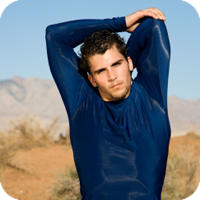The goal of progressive muscle relaxation is to reduce the tension in your muscles. First, find a quiet place where you’ll be free from interruption. Loosen tight clothing and remove your glasses or contacts if you’d like. Tense each muscle group for at least five seconds and then relax for at least 30 seconds. Repeat before moving to the next muscle group.
- Your face. Squint your eyes tightly, wrinkle your nose and mouth, Clench your teeth, and pull back the corners of your mouth toward your ears, feeling the tension in the center of your face. Relax. Repeat.
- Neck. Gently touch your chin to your chest. Feel the pull in the back of your neck as it spreads into your head. Relax. Repeat.
- Shoulders. Pull your shoulders up toward your ears, feeling the tension in your shoulders, head, neck and upper back. Relax. Repeat.
- Upper arms. Pull your arms back and press your elbows in toward the sides of your body. Try not to tense your lower arms. Feel the tension in your arms, shoulders and into your back. Relax. Repeat.
- Hands and forearms. Make a tight fist and pull up your wrists. Feel the tension in your hands, knuckles and lower arms. Relax. Repeat.
- Chest, shoulders and upper back. Pull your shoulders back as if you’re trying to make your shoulder blades touch. Relax. Repeat.
- Stomach. Pull your stomach in toward your spine, tightening your abdominal muscles. Relax. Repeat.
- Upper legs. Squeeze your knees together and lift your legs up off the chair or from wherever you’re relaxing. Feel the tension in your thighs. Relax. Repeat.
- Lower legs. Raise your feet toward the ceiling while flexing them toward your body. Feel the tension in your calves. Relax. Repeat.
- Feet. Turn your feet inward and curl your toes up and out. Relax. Repeat.
Perform progressive muscle relaxation at least once or twice each day to get the maximum benefit. Each session should last about ten minutes.
Another way of relaxing your muscles is through massage. Massage is a system of pressing and kneading different soft tissues in the body (muscles, tendons, and ligaments). Massage offers a variety of health benefits: pain relief, relaxation, improved muscle tone, stimulation of circulatory and lymphatic systems, and more efficient elimination of waste throughout the body. Although a single massage will reduce fatigue, relax you, and provide mild stress relief, the effects of massage are cumulative. A course of massage treatments will allow you to reap the most benefits. Ultimately, massage can rejuvenate you physically, mentally, and spiritually. Massage rates can vary between $50 and $125 per hour, depending on the massage therapist and the location where you receive your massage. For example, you will pay more for someone to travel to your home to provide massage therapy. Fortunately, many chiropractic centers offer massage therapy as part of their services.




